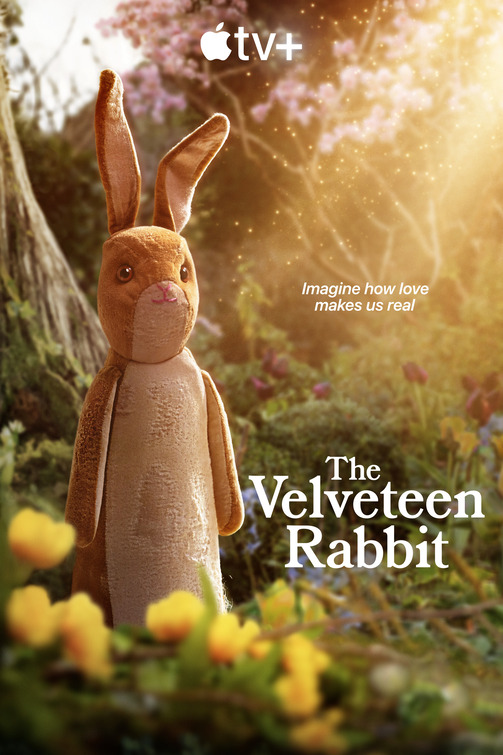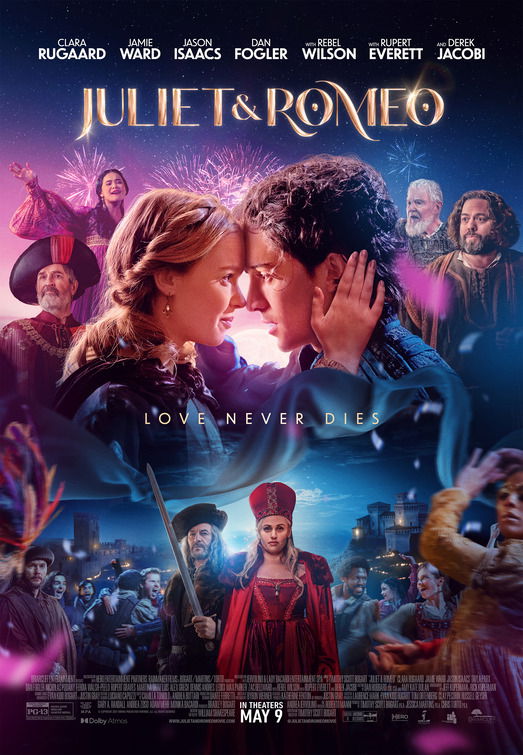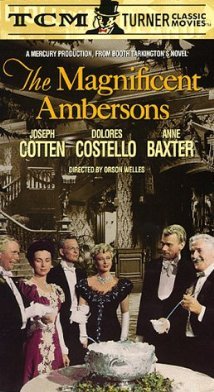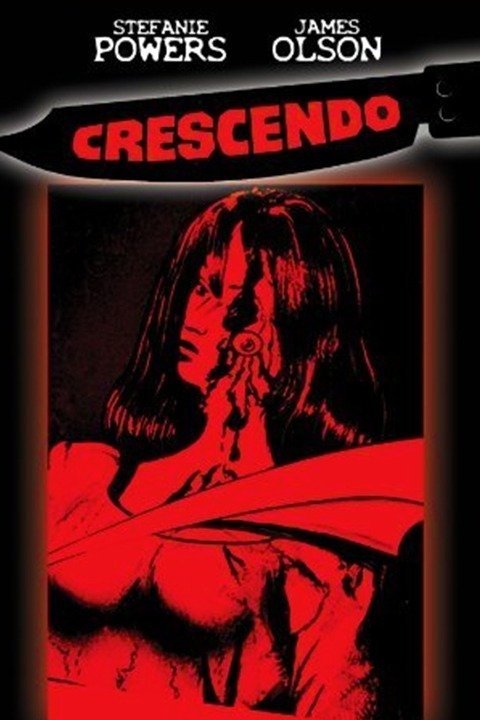“Not Your Grandfather’s Shakespeare”

| None | Light | Moderate | Heavy | |
|---|---|---|---|---|
| Language | ||||
| Violence | ||||
| Sex | ||||
| Nudity |
What You Need To Know:
Despite a few flaws, JULIET & ROMEO is beautifully shot, costumed, staged, and acted. Some of the songs sound the same, but the songs grow on you and several songs stand out above the rest. JULIET & ROMEO has a strong Christian, moral worldview, with positive references to God, Jesus, the Bible, and a church and its clergyman. However, one song in JULIET & ROMEO has two strong profanities, part of the story involves references to illicit romantic meetings, and the ending revolves around two recently married young lovers who fake their suicides to run away from their feuding families. So, MOVIEGUDIE® advises caution.
Content:
Strong Christian, moral worldview includes multiple references to God, Jesus, the Bible, and a couple biblical passages, the plot is driven by the theme that love and brotherhood overcome differences between families, including feuds, a priest is a positive figure who extols peace and tries to do the right thing, mitigated by some Romantic elements about falling in love at first sight and deception, with a political correct sing that seems a bit feminist in a politically correct way;
One “s” word, one “h” word, two GD profanities in a song’s lyrics, and two light exclamatory profanities, plus priest makes two or three appeals to God such as “God save us”;
Some strong and light violence with light blood and wounds and two fatal wounds includes young men fight one another in two scenes, two young men stage an exhibition swordfight, and it’s clear there’s no love lost between them, soldiers chase some young men who’ve been fighting in the streets, male title character’s father knocks him down and bloodies his son’s lip when the son sneaks over the walls enclosing the family’ s abode, a final fight involves two men being killed, and two recently married young lovers fake their suicides to run away from their feuding families;
Implied fornication when one young man wakes up in bed next to his current girlfriend, the cast sings a song at a tavern about loving someone tonight but singing that this doesn’t mean they will love the person tomorrow, an implied marital scene between Romeo and Juliet after the friar marries them, and Romeo and Juliet kiss passionately while courting one another;
No sexual nudity, but some upper male nudity and some female cleavage;
Lots of alcohol use at a get-together at a local tavern, where at least one young man is clearly drunk, plus some other cases of social drinking;
No smoking, but the local apothecary gives Romeo some “herbs” for relaxation, and two lovers drink a potion that will put them into a deep sleep simulating death but will kill them if they don’t take an antidote in time; and,
Two recently married young lovers fake their suicide to run away from their feuding families, two families are engaged in a terrible feud, young people sneak out of their homes at night, and parents of a young woman arrange a marriage for her without telling her (they leave it to the intended groom).
More Detail:
The movie opens with a brief prologue about the history of Verona and Northern Italy. By the 11th Century, Northern Italy was dominated by city states like Verona with a republican form of government. The prologue explains that the city states kept both the Catholic Church and the imperial powers at bay. By 1301, however, tensions between the Church and the imperial powers in Rome have grown. So, the royals in Rome send a prince named Escalus to rally the city of Verona to their cause against the Pope. However, Verona is split between two feuding families. Shakespeare called them the Capulets and the Montagues, and the movie uses those surnames. However, the two names historically are actually Cappelletti and Montecchi (the Italian equivalent to Montague), and the famous Medieval poet Dante (who often spent time in Verona) mentions them in Book II of THE DIVINE COMEDY as examples of feuding families.
Sadly, as the movie’s first scene after the prologue depicts, the feud between the Capulets and the Montagues has led to the death of their heirs, Romeo and Juliet, who had the temerity to fall in love and commit suicide. Their tragic deaths have brought the two families together to hear Father Lawrence, the local friar, perform the funeral and honor the love between the two teenagers.
Cut to three days earlier. It’s night, and the people of Verona are celebrating some kind of festival. Juliet, the female heir of the Capulets, has just arrived from school in France. Romeo, the son of Lord Montague, spies her in the crowd as she exits her carriage, and it’s immediately love at first sight.
Meanwhile, Romeo’s best friend, Mercutio, who was adopted by Lord Montague when his parents died, engages in a swordfight exhibition with Juliet’s cousin, Tybalt. The fight isn’t to the death, but there’s clearly no love lost between the two young men. The fight soon ends with a tussle between the young men from the Capulets and Montagues.
After briefly meeting Romeo, Juliet leaves to visit Tybalt and her mother. Then, Romeo, Mercutio and the other young men of the extended Caplet family retire to the local tavern. They sing a boisterous song about romance, singing repeatedly, “Because I love you tonight doesn’t mean I will love you tomorrow.” Romeo halfheartedly joins in because his thoughts are on Juliet. Meanwhile, Juliet sneaks out of her family’s house with her friend, Rosaline.
Leaving the party at the tavern, Romeo visits Father Lawrence, the friar at the church. He complains to the friar about all the demands placed on him as the eldest heir of his family. He tells the friar that he doesn’t believe anything he does as an heir will change anything. However, the friar disagrees with Romeo. He also tells him he’d rather Romeo leads the Montague family than anyone else. The friar notices something about Romeo has changed, and Romeo confesses that he met a girl today. “You meet a girl every day!” Friar Lawrence reminds him. Romeo starts talking about Juliet, not knowing that she’s a Capulet, and the Friar correctly surmises that this girl is different. Romeo is seriously smitten.
Romeo sneaks back home, only to be confronted by his father, who berates Romeo for letting Mercutio takes his place in the exhibition against Tybalt. He tells Romeo that the royals at Rome are coming to take over Verona. Romeo replies, “They can have it.” His father angrily reminds Romeo that, if the royals choose the Capulets rather than the Montagues, that will be the end of Romeo’s family. You better stand with your family, Romeo’s father warns him. Meanwhile, Juliet’s father, Lord Capulet, tells Tybalt that the Capulets will have to take a stand with the royals in Rome or the Pope.
Romeo rides his horse back to the tavern, where he sees that Juliet’s there. Before he can talk to her, however, she leaves with Rosaline and Romeo starts to follow. However, he runs into his younger cousin, Benvolio. Suddenly, though, Tybalt and two of his buddies arrive. Itching for a fight, Tybalt starts to confront Romeo when Mercutio arrives with two of his friends. Tybalt shoves Romeo, and a fight ensues. Soldiers arrive to break it up, and everybody runs away, with the soldiers following through the tavern and small alleyways.
Juliet happens to notice the soldiers chasing Romeo, so she distracts them by grabbing Romeo and giving him a passionate kiss. The soldiers pass them by, and the two lovers end their embrace. Romeo says, “I’m not sure what to say.” Juliet, replies, You can tell me I’m a good kisser,” and he says, “You’re a great kisser actually.” A moment of awkwardness follows, and Romeo says, “I don’t know why I said that,” with Juliet replying, “The truth shall set you free.” “Not usually, no,” Romeo begins, then pauses, not knowing what to say next.
At that moment, Rosalind sees them, with Mercutio close behind her. Rosalind asks Juliet, “Wait, you know him?” Mercutio chimes in, “You idiot! She’s the girl, huh?” They have to go because the soldiers have circled back to the adjoining alley.
When Mercutio and Rosaline have gone, Romeo asks Juliet, “Who ARE you, really?” Juliet replies, “What’s a name, really?”
They have to leave, because the soldiers are still hunting for everyone. Romeo takes Juliet to a secret passageway behind the apothecary or chemist’s shop (pharmacist’s shop, in the American vernacular). The passageway leads them past the old salt mines and to the church. The friar isn’t there for the moment, but, while they start to converse, both of them realize that Romeo is a Montague and Juliet is Capulet.
Romeo and Juliet have just started getting to know one another when Friar Lawrence suddenly arrives and, seeing the two together, realizes the dangers that will follow if Romeo loves Juliet and vice versa. He goes to fetch a carriage to take Juliet home. While he’s gone, Romeo and Juliet share another passionate kiss, and the friar returns just in time to see them. “Are you kidding me?” he exclaims. “A Montague and a Capulet? It would set the world on fire!” Friar Lawrence then departs with Juliet to take her home, leaving Romeo alone to sing a romantic ballad. Meanwhile, in the carriage, Juliet sings the same song, intercut with fantasy scenes of them lyrically dancing together in the aisle in the church, with Jesus looking down on them from the Cross above.
The next day, Juliet’s mother tells her they’re holding a masquerade ball that evening in her honor, to celebrate her return home. Juliet complains she’s not ready for such a thing, but her mother is adamant. The Capulet women sing a song about the masks they must wear as a Capulet.
Meanwhile, Romeo’s father tells Mercutio he thinks that, at the ball being held by the Capulets, Lord Capulet will announce an alliance with the local royal, Lord Paris. He asks Mercutio to secretly attend the ball and confirm his suspicions.
Mercutio coincidently finds Romeo lurking in the woods behind the Capulet manor. He tells Romeo about his father suspicions about the alliance and urges Romeo to forget his love for Juliet. Juliet’s our enemy, Mercutio says, and if the Capulets align with Lord Paris, Romeo’s father will need every Montague by his side, especially his real son. “You’ll never disown your own name,” Montague says, but Romeo says, “What’s in a name,” and Mercutio replies, “Everything.” However, Romeo reminds Mercutio that, even though Mercutio is adopted, he will always be his brother. “What’s in a name indeed?” Mercutio realizes he can’t change Romeo’s mind about Juliet and wishes him well.
So, Romeo disguises himself and enters the Capulet manor to visit Juliet secretly. They sing another romantic ballad, ending with another passionate kiss. They again visit the church and ask Father Lawrence to marry them. The friar agrees, hoping their union will bring true peace to Verona.
However, that night at the masked ball, Juliet’s father and mother introduce Juliet to Lord Paris. However, Juliet is distracted because she spies Romeo in a mask. Not only that, but Mercutio and Tybalt also figure out that Romeo is there, hiding behind a mask. Lord Paris then tells Juliet that her parents have arranged a marriage between him and her. “It’s been decided,” Paris says. “Not by me,” Juliet angrily says, then walks away. Juliet’s mother gets angry her, but Juliet runs to Romeo on the dance floor. Everyone notices something’s wrong, especially Tybalt and Lord Paris. Chaos ensues, and the stage for tragedy is set. Or, is it?
JULIET & ROMEO changes the order of the plot in Shakespeare’s play in major places. For example, in the play, Romeo and Juliet secretly get married after the masked ball, not before it. Also, there are major plot twists after the masked ball and during the ending.
Traditionalists will object to these changes, especially the ending, which is very different from the original play. However, the movie’s title, which is JULIET & ROMEO, not ROMEO AND JULIET, should alert viewers that this is not your grandfather’s Shakespeare. After all, many of Shakespeare’s plots, including this one, are stolen from other people and other legendary stories. Not to mention the fact that this movie only borrows a few phrases from Shakespeare’s play, contains no or very little iambic pentameter and is told in modern English.
So, the questions to ask yourself when critiquing JULIET & ROMEO are not whether it’s an accurate depiction of Shakespeare’s play, but whether it fulfills what the filmmakers intended to do and whether it was entertaining and worth doing.
Well, except for a few flaws and shortcomings, JULIET & ROMEO is beautifully shot, costumed, staged, and acted. Though some who’ve seen the movie think the two romantic leads, Clara Rugaard and Jamie Ward, are a bit underwhelming, MOVIEGUIDE® didn’t find that to be the case. The scenes between them are fine. After all, the two lovers are supposed to be young and totally in love, and that’s not really something that lends itself to powerhouse theatrical or cinematic performances. It’s also true, however, that, of all the actors, the two best performances are by the great Derek Jacobi as the friar and Nicholas Podany as Mercutio. In fact, the movie’s dramatic and emotional highlight comes when a seriously wounded Mercutio tells Romeo, “A plague on both your houses” (maybe someone should write a movie or play with Mercutio as the lead character). That moment is enhanced, though, by the strong scene about brotherhood between Mercutio and Romeo.
Also, some songs in JULIET & ROMEO sometimes sound too much alike. However, several songs stand out above the rest, such as the two romantic ballads, “Beat the Same” and “Don’t Look Down,” and a comical duet between the friar and the apothecary (Dan Fogler), “I Should Write This Down.” After listening to the songs during the end credits or during a reprise, they grow on a person. However, in the movie’s first act, the instruments seem overproduced and consequently tend to drown out the singers.
JULIET & ROMEO also has some good editing that holds the viewer’s attention. JULIET & ROMEO has a strong Christian, moral worldview.
For example, it has positive references to God and Jesus Christ in scenes set in the church and scenes featuring the friar, who secretly marries Romeo and Juliet. Also, the friar appeals to God and a Saint. Finally, someone asks at one point about whether Jesus, who appears on the Cross above the church altar, will approve of what’s been done to help Romeo and Juliet. The answer is in the affirmative.
Also, the friar clearly supports peace between the Capulets and the Montagues, with no more fighting. His sentiments are supported by one of the tragic outcomes of the fighting between the two families and their young men. The friar hopes that the love between Romeo and Juliet will be the spark that brings peace to Verona and make the city stronger when it comes up to standing against the political factions from Rome. This theme is supported by the question that Juliet asks Romeo and Romeo asks Mercutio, “What’s in a name?” And, it’s beautifully embodied in the scene between Romeo and Mercutio when Romeo tells his adopted brother that, though they have different parents, he will always consider Mercutio his brother.
That said, JULIET & ROMEO has some acceptability issues.
For example, it has some Romantic elements, not the least of which is the emotional weakness that falling in love at first sight has regarding the two title characters. The movie also sometimes has references or allusions to illicit romantic behavior, such as a line of dialogue or a song lyric. Also, one brief scene shows Mercutio waking up next to the woman with whom he was dancing the previous evening. The movie also shows two separate scenes where a young man appears to be drunk. Also, one of the songs has two strong profanities. Romeo buys some herbs to “relax” him, and the friar buys some herbs to calm his nerves when he learns that Romeo and Juliet have fallen in love. Finally, the movie’s ending hinges on a plot where two recently married young lovers fake their suicides to run away from their feuding families and an arranged marriage.
So, MOVIEGUIDE® advises caution for older children.


 - Content:
- Content: 



